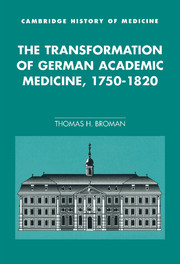Book contents
- Frontmatter
- Contents
- Acknowledgments
- Introduction
- 1 Physicians in eighteenth-century Germany
- 2 Fractures and new alignments
- 3 Physicians and writers: Medical theory and the emergence of the public sphere
- 4 The art of healing
- 5 Breaking the shackles of history: The Brunonian revolution in Germany
- 6 German academic medicine during the reform era
- Conclusion: Disciplines, professions, and the public sphere
- Index
- Cambridge History of Medicine
6 - German academic medicine during the reform era
Published online by Cambridge University Press: 30 September 2009
- Frontmatter
- Contents
- Acknowledgments
- Introduction
- 1 Physicians in eighteenth-century Germany
- 2 Fractures and new alignments
- 3 Physicians and writers: Medical theory and the emergence of the public sphere
- 4 The art of healing
- 5 Breaking the shackles of history: The Brunonian revolution in Germany
- 6 German academic medicine during the reform era
- Conclusion: Disciplines, professions, and the public sphere
- Index
- Cambridge History of Medicine
Summary
Revolutions do not conform to a single historical pattern. Some follow a logic of development that builds to a radical denouement, while others may incorporate moments of radicalism, but never reach a climactic resolution. Instead, they simply lose energy gradually, like a hurricane whose force is spent by traveling over land. Beyond any question, the Brunonian revolution resembled the second kind. As the first years of the nineteenth century slipped by, the energy and rancor of the debate over Brunonianism diminished noticeably. This was so much the case that by 1811, when Andreas Roschlaub published a letter in the Journal der practischen Heilkunde declaring in effect that he no longer held to the principles of Brunonianism, the gesture had little dramatic impact. Hufeland, the editor of the Journal, permitted himself a smug, self-congratulatory observation to mark the occasion, but the moment passed largely unnoticed.
Although the final act of the Brunonian revolution may have played before a nearly empty house, its impact on German medical theory and practice was substantial. At least for the short term, the most significant product of the controversies over Brunonianism was the construction of a stout wall between theory and practice. The great majority of physicians who wrote on practice after 1810 continued to speak of it in terms of a Kunst characterized by the physicians' creative synthesis of judgment, experience, and talent.
- Type
- Chapter
- Information
- The Transformation of German Academic Medicine, 1750–1820 , pp. 159 - 192Publisher: Cambridge University PressPrint publication year: 1996



